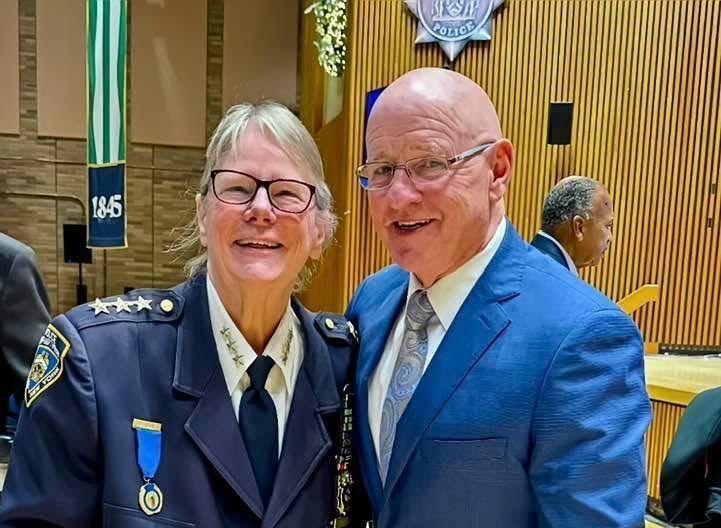By Earle Hitchner
Last week I wrote very briefly about Natalie Merchant's "Leave Your Sleep," featuring the Irish traditional band Lunasa on four tracks. Merchant's new, deluxe edition, double-disk album is on the Warner Music Group Company label Nonesuch, a word meaning "without equal," which might also describe this highly ambitious, doubtlessly risky, and possibly groundbreaking new recording from a singer-songwriter who first gained fame with 10,000 Maniacs.
Formed in 1981 in Merchant's economically depressed hometown of Jamestown, N.Y., 10,000 Maniacs was a pop-folk-rock band who spawned several hits, including "Trouble Me," "These Are Days," "Hey Jack Kerouac," "Verdi Cries," and a pre-fatwa cover of Cat Stevens's "Peace Train." Lead vocalist Merchant toured and recorded with the band for a dozen years and went solo after recording 10,000 Maniacs' "MTV Unplugged," issued in 1993.
Her decision to leave 10,000 Maniacs proved prescient. "Tigerlily," her widely lauded solo debut in 1995, produced such hits as "Carnival," "Jealousy," and "Wonder," and went on to sell more than five million copies. Merchant, firmly established as a solo singer and thoughtful songwriter, found greater commercial and critical success than ever before.
She made several more solo recordings, and in 2003, on her own Myth America Records imprint, Merchant released "The House Carpenter's Daughter," her first solo studio album of songs she had no hand in composing.
On it are "House Carpenter" and "Down on Penny's Farm," songs recorded respectively by Clarence Ashley in 1930 and the Bently Boys in 1929 that were included on "Anthology of American Folk Music," an 84-track, multiple-record package edited by Harry Smith and released in 1952. "It was the founding document of the American folk revival," well-known music scribe Greil Marcus stated.
The effect on a young, impressionable Natalie Merchant was no less profound. "Harry Smith's 'Anthology of American Folk Music' was in my local library, I took it home, and it blew my mind," she told me. "It changed my life forever."
Since "The House Carpenter's Daughter" CD in 2003, Merchant issued no solo studio recording until "Leave Your Sleep." But in those intervening seven years the Hudson Valley resident was not unproductive: She gave birth to a daughter, Lucia, in 2003 and then burrowed into "poems, stories, and songs that I found to delight and teach her," Merchant wrote in her liner notes. Many of the poems had inventive wordplay and sometimes mouth-watering rhymes (e.g., Jack Prelutsky's "Bleezer's Ice-Cream"), and soon she was composing music for them.
"I wanted to illustrate the poems with different music," Merchant said to me. "My daughter had the opportunity to meet the musicians and watch the whole project unfold in the studio. I liked curating the project myself."
Friend to the Irish
During our conversation about Lunasa and other Irish musicians and music, Merchant injected a complaint about Wikipedia, which claims her maternal grandfather was Irish. "I'm half-Sicilian, part-German, and part-French," she said matter-of-factly. "There's no Irish in there. It's my proof that Wikipedia is not a good source for student book reports."
Her lack of Irish blood, however, does not indicate a lack of interest in Irish music. She's recorded and performed with Dublin-born singer Susan McKeown, who lives in New York City, and Brittany-born vocalist Katell Keineg, who lived for a time in Ireland, and this past January, Merchant performed with Lunasa at Celtic Connections in Glasgow and will perform with them again on July 31 at the Cambridge Folk Festival in England.
"Natalie is very, very aware and knowledgeable in relation to what's happening in Irish music and has a deep love and respect for our songs and tunes," Lunasa flute, whistle, and bodhran player Kevin Crawford pointed out in an e-mail to me. "During our rehearsals with her, she would quite regularly launch into a Dolores Keane or Triona Ni Dhomhnaill classic, and we'd all jam along for a few minutes of light relief."
Merchant's admiration for what Lunasa brought to "Leave Your Sleep" is apparent in the album's opening track, her musical setting for Charles Causley's poem "Nursery Rhyme of Innocence and Experience." Even with eight classical violins, two violas, and two cellos backing her, the distinctive Lunasa sound of Crawford's low whistle, Cillian Vallely's uilleann pipes, Sean Smyth's fiddle, Paul Meehan's acoustic guitar, and Trevor Hutchinson's upright bass is central to that song.
The other three songs with Lunasa feature only them accompanying Merchant: "Crying, My Little One," based on a Christina Rossetti poem; "I Saw a Ship A-Sailing," based on an anonymous verse; and "The Walloping Window Blind," based on a Charles Edward Carryl poem. The nautical jaunt of that last song is highlighted by some overdubbed "heave-ho" shouts and lilting from--surprise--Kevin Crawford, comfortably in sync with Lunasa's potent instrumental performance.
"We are very proud of our tracks on 'Leave Your Sleep' and feel we connected with Natalie from the get-go, which really made the process of making music a very natural and rewarding task," Crawford said.
Arts in Peril
As heartening as those collaborations with Irish and other Celtic musicians have been for Merchant, the budget cuts facing the New York State Council on the Arts, of which she's a member, have been disheartening.
"I've been on the council for three years," she told me, "and in that period the budget went from $55 million to $41 million to what now could be just $25 million, which would cripple the agency. People forget that billions of dollars in economic growth for New York State are directly linked to the arts each year."
A case in point is the popular and justly praised Catskills Irish Arts Week, which provides a significant boost each summer to the economy of East Durham, N.Y. NYSCA provides some public funding for CIAW.
A prize-winning poet, distinguished literary critic, accomplished librettist, former chairman of the National Endowment for the Arts (2003-2009), and the 2010 recipient of the University of Notre Dame's Laetare Medal, the oldest and most prestigious honor given to an American Catholic, Dana Gioia met Natalie Merchant a few years ago at the finals of the Poetry Out Loud National Recitation Contest, a program brought to fruition during his NEA tenure. More than 325,000 students now participate in the program across the country each year. Merchant, who sang at the finals, enlisted Gioia's help to get information on poet Charles Causley, whom Gioia knew personally and had written about.
"Poetry and song are deeply interrelated arts," said Gioia, citing Merchant's new album as an example. "For most of human history they were, in fact, the same art. Poetry is the art of heightening language with expressive effects to make it more powerful and memorable. Meter, rhythm, and melody are all ways of doing it."
If this marrying of poetry to melody can be so compelling, why isn't there more of it, especially in Irish traditional music? Consider Yeats' poems "Down by the Salley Gardens" and "The Fiddler of Dooney," each beautifully set to music in a song of the same title that was memorably recorded by Clannad and Sean Doyle, John Doyle's verse-loving father, respectively.











